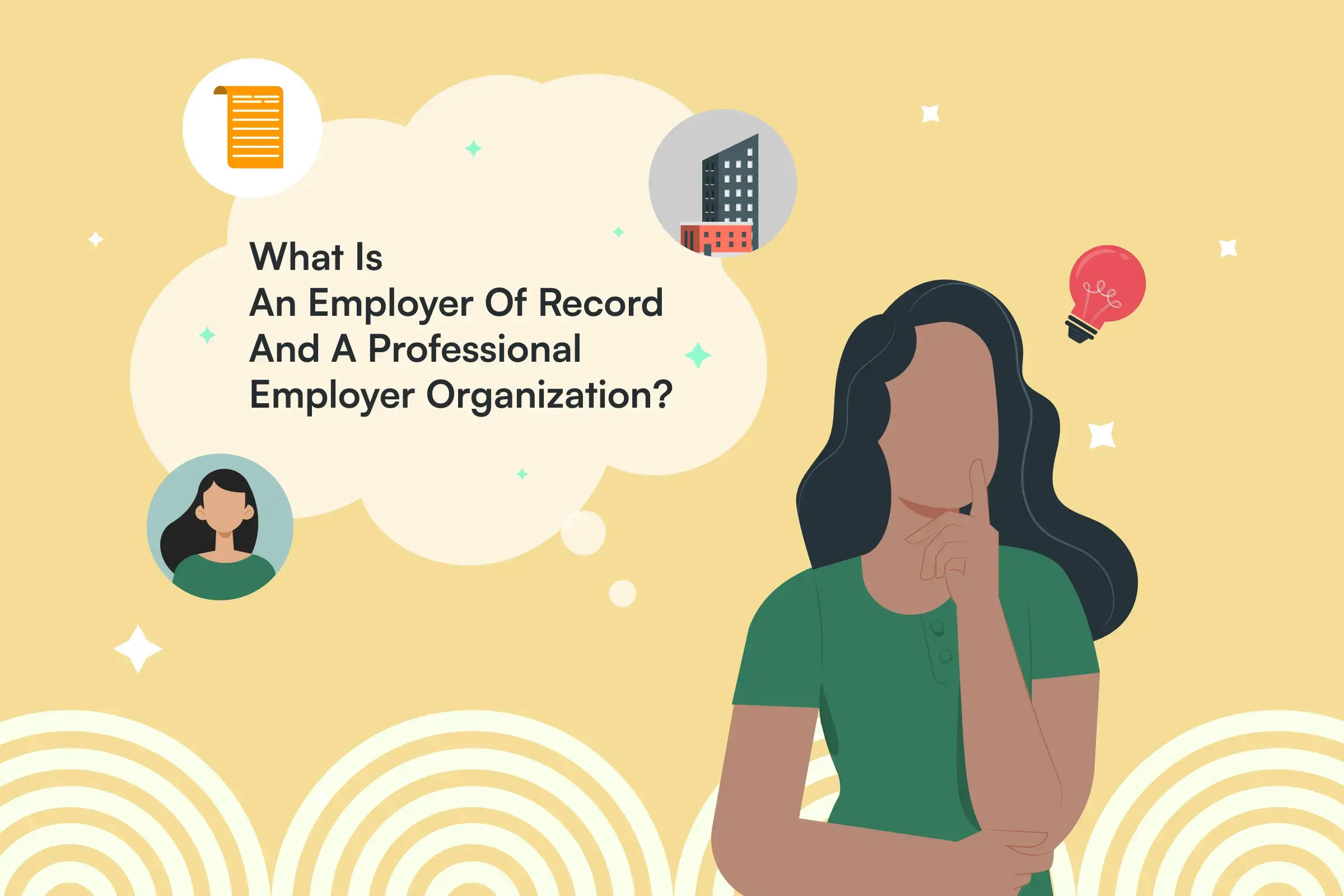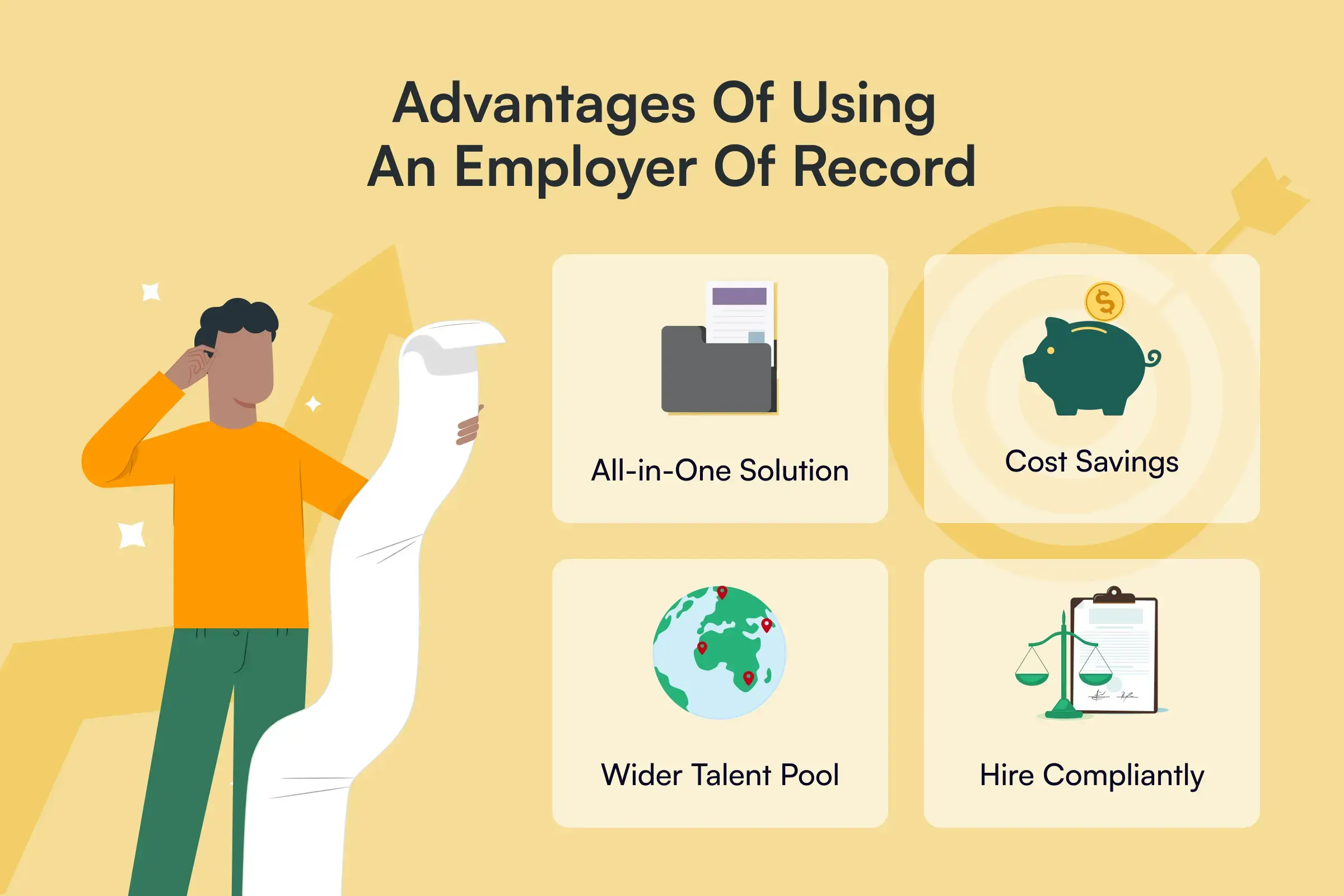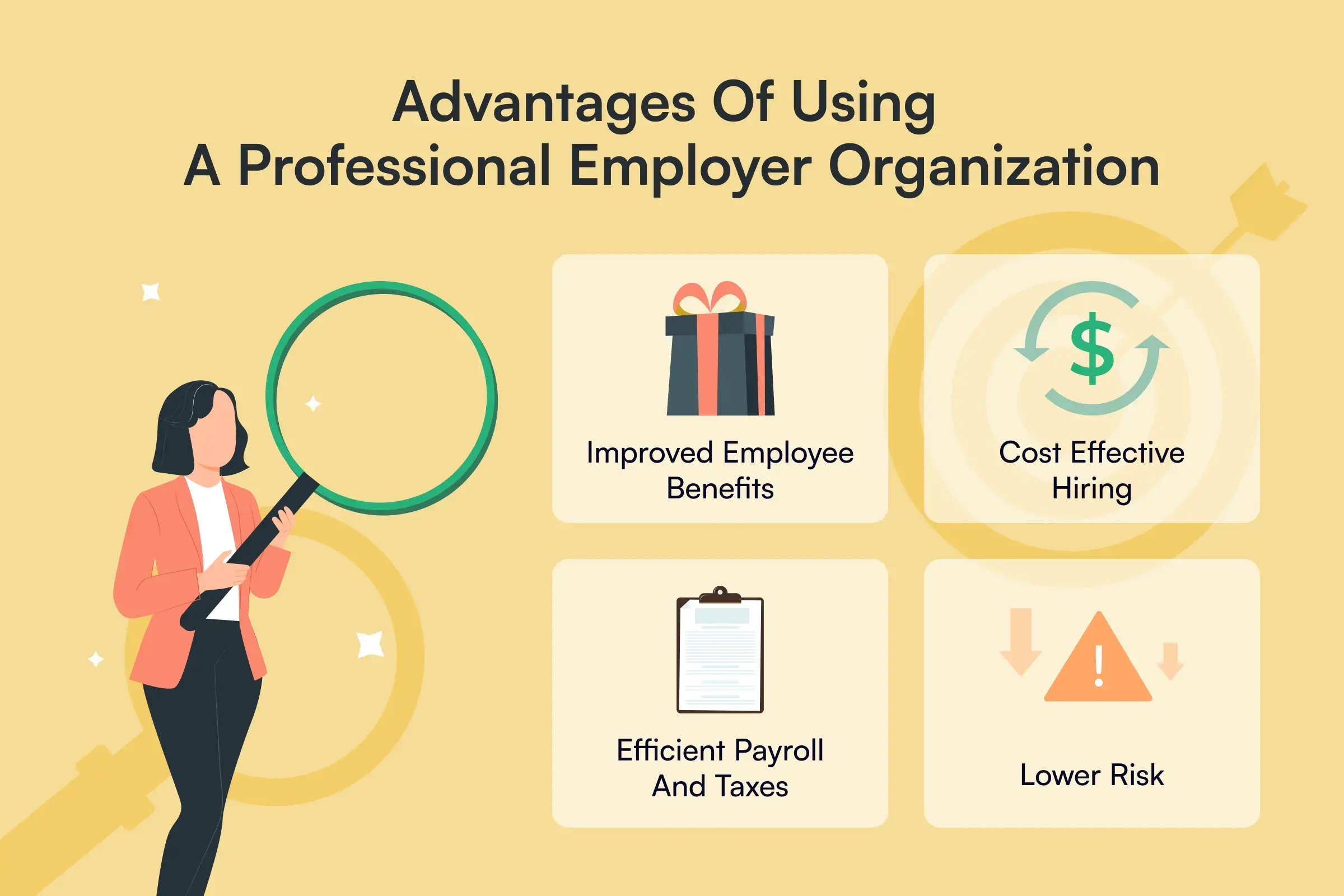In today’s increasingly global world, companies can benefit in several significant ways by hiring from international countries. Hiring in new countries can help you access new markets, access a much wider talent pool, and foster a more diverse and inclusive workforce at every level.
Companies that want to hire globally have a few options. Organizations can either set up their own local entity in the country they want to hire from, or they can choose to partner with a company that specializes in hiring international talent. Generally, two of the most popular options for this route are choosing to engage an employer of record or a professional employment organization.
While both options perform similar functions, there are some key differences between an employer of record vs a professional organization that must be considered. Both choices can handle different aspects of employment and help you grow your company.
Confused about where to start or what the differences between the two choices are? This guide will tell you everything you need to know when hiring international employees or contractors through either option.

What is an Employer of Record (EOR)?
An employer of record is a third party that acts as a local legal entity for your company in the country you wish to hire. This means you will not be responsible for setting up your own legal entity to hire international workers, allowing you to tap into diverse global markets without worrying about local employment laws. Some countries have relatively complicated processes for registering a business.
An employer of record, in contrast to a professional employment organization, will handle all aspects of the hiring process. This includes administering payroll, handling all tax withholdings, enrolling your employees in benefits programs, and more.
A global employer of record has legal entities in multiple countries, allowing your company to attract top talent from around the world without the risk of violating local labor laws or noncompliance penalties. Additionally, an employer of record can provide key guidelines to ensure all employment standards are met.
What is a Professional Employer Organization (PEO)?
A PEO acts as a co-employer instead of a local entity, which is one of the key differences between a PEO and an EOR. This means that your professional employer organization will handle important HR functions like payroll, benefits, and training and help you remain compliant with local labor laws.
In this case, you retain control over all business decisions, including daily management of your workforce, and the PEO is contracted for certain administrative tasks. Engaging a PEO is generally a good choice for small to medium-sized businesses that want to grow and reach new markets.
Additionally, the PEO will share certain employer responsibilities and liabilities, including risk management and other important factors for hiring employees.
Differences Between an EOR and a PEO
While the two vendors are similar and can help your company achieve long-term success in new markets, there are also key differences between an EOR and a PEO that you’ll need to understand to know which one is best suited for your business needs.
An employer of record acts as the full legal employer in the country you’re hiring in. The EOR takes on all aspects of the hiring process and can keep you compliant with important employment legislation, which can give you more time and energy to spend on making important decisions.
A professional employer organization is a co-employer, meaning that the company and PEO share certain responsibilities or obligations when employing workers. Additionally, a PEO tends to offer services to companies that already have a set legal entity in the country of hire. This allows you to hire international workers quickly and compliantly, but you’ll also be responsible for certain aspects of the employment agreement.
However, it’s important to know that both options offer some overlapping services, such as handling your payroll withholdings, administering benefits, and keeping detailed records of tax or other financial obligations. Understanding EORs vs PEOs is vital when deciding between the two types of companies.

Advantages of Using EORs
Companies that choose to engage an employer of record can benefit in several ways. Organizations that opt for this route can legally hire employees without worrying about complicated labor laws among other advantages.
All-in-One Solution
Employers of record will generally provide an extensive range of services that make it easy to hire and obey all relevant labor laws. Employers of record offer many of the same key benefits as a PEO.
Employers of record will manage your company’s payroll requirements and all necessary tax withholding, enroll your employees in benefits programs, onboard new hires, manage terminations, and accurately deduct taxes.
Cost Savings
Companies that hire through an employer of record can benefit by saving money. In most cases, a company must set up their own local entity when hiring internationally. This can be a time-consuming and expensive process, and there are several requirements that must be met by the employer. Your employer of record acts as your local entity, meaning you won’t need to cover expenses or navigate bureaucratic processes.
Access a Wider Talent Pool
Companies that choose to partner with an EOR can gain access to a much wider talent pool when hiring. Your EOR enables you to recruit skilled workers from the country you wish to hire from without needing to set up your own entity, meaning you can hire quickly and efficiently.
Engaging an EOR when recruiting international workers can also remove entry barriers and help you build a presence in major markets. Additionally, your employer of record can also help you boost retention rates for your existing workforce by handling all aspects of benefits administration.
Hire Compliantly
In addition to providing access to a wider talent pool, an employer of record can help keep you compliant with the local labor laws in the country of hire. Your employer of record handles all aspects of the hiring process, including payroll, tax withholdings, and more. The EOR will draft legal and valid employment contracts for any prospective employees.
The EOR has comprehensive expertise in the country you want to hire in and can provide guidance at each step. For example, the employer of record will have an in-depth understanding of termination laws or regulations in that country and can help you obey the rules when dismissing workers.
Your employer of record will also be liable for all aspects of the hiring process. This can help your company avoid potential legal trouble if any issues arise.
The employer of record will also ensure that all workers are classified correctly. The EOR will know the difference between employees and independent contractors and will ensure that any required benefits or time off have been provided. This means you won’t need to worry about misclassification, which can bring severe financial penalties, reputational damage, and potential legal action.
Challenges of Hiring with an Employer of Record vs a Professional Employer Organization
While hiring with an employer of record provides several advantages, there are also some challenges that companies may need to consider when deciding between hiring an EOR vs a PEO.
Costs
The required cost to engage an employer of record may be one of the most severe challenges a company may face. Organizations that choose to partner with an EOR will need to provide payment for services rendered.
Additionally, many EORs charge a fee for every employee you want to hire. This means that companies that want to hire a larger workforce in the country may pay more in the short term when building an international team. Generally, EORs will charge $50 to $500 per employee depending on the service required, and the total fees typically range from $200 to over $1000.
Companies will also need to be aware of what they’re paying for, including setup fees, a deposit, foreign transaction fees, and any additional employment costs. This is in addition to any mandatory employer costs, such as salaries or benefits.
Loss of Control
Companies that choose to recruit talent through an employer of record vs a professional employment organization may feel like they have less control throughout the hiring process. The employer of record becomes the legal entity in the country you want to hire in and handles certain employment responsibilities, meaning that companies will outsource important functions.
The employer of record also handles the onboarding process for every new hire. EORs usually have staff that specializes in certain aspects of training, though employers may feel like they have less influence over the onboarding process.
With the lack of control over the onboarding process, companies may also find it difficult to prepare new hires for company-specific policies or culture. This can be a particularly significant issue for companies that hire remote staff from different countries, so companies may need to consider how to build a virtual team effectively.
Managing a remote team can come with other difficulties, such as accommodating cultural differences or navigating language barriers.

Advantages of Using a Professional Employer Organization vs an Employer of Record
EORs provide a range of benefits and services that can help companies grow in new markets, but a PEO may offer services that align with your long-term expansion plans. In some cases, companies may be better off by choosing to engage a professional employer organization.
Improved Employee Benefits
One of the main advantages of using a PEO is access to better benefits packages. This is particularly important for smaller companies, as your PEO can give you the opportunity to provide employees with more comprehensive benefits packages at a significantly cheaper rate than might be available otherwise.
Plans can include important supplementary benefits, such as dental, vision, prescription drugs, disability coverage, and more. The professional employer organization can also help your employees have a better understanding of what benefits are available to them.
PEOs handle administrative tasks like negotiating different packages, enrolling employees in benefits programs and any other legal requirements.
Cost-Effective Hiring
Companies can also save a significant amount of money by hiring through a PEO. With a professional employer organization, organizations will not need to hire a dedicated HR staff. This means a business will not need to employ an entire team to handle certain functions, which saves money in the long run.
Additionally, the PEO will file paperwork, negotiate with benefits companies, and understand local labor laws, giving you more time to spend managing your global team.
Generally, PEOs will use one of two payment structures. In some cases, the organization may opt for a fixed monthly fee per employee, or they can charge based on a percentage of payroll plus any related taxes, workers’ comp fees, and liability insurance.
Efficient Payroll and Taxes
Another major benefit of engaging a professional employer organization vs an employer of record is that a PEO will handle certain aspects of payroll for your company. This includes paying employee salaries accurately and on time, withholding the required taxes, handling all social security contributions for the relevant authorities, and more.
Having a PEO handle payroll and other HR tasks can save your company a significant amount of time. With a PEO, your company will not need to worry about local taxation laws. The professional employer organization will remain up-to-date with any important labor laws or tax regulations and make sure you follow all the rules.
The PEO will also handle other employment-related costs, such as workers compensation and unemployment insurance if necessary.
Lower Risk
Hiring employees through a PEO can also reduce the risk of legal trouble and financial damages for an employer. In contrast to an EOR, which assumes liability for employment issues, a professional employer organization offers shared liability with your company.
The PEO acts as the administrative employer, and the company acts as the worksite employer. In this case, the professional employer organization may assume responsibility for administrative issues. PEOs can also help you ensure safe working conditions for employees.
Challenges of Hiring Through a PEO vs EOR
Engaging in a Professional Employer Organization can help your business access several benefits, but there are some key drawbacks that must be considered. Understanding the potential downsides can help you make the right choice when choosing between a PEO vs an EOR.
Less Flexibility
Your professional employer organization will handle all aspects of negotiating prices for benefits packages and enrolling employees in the program. This means that companies will have less flexibility when it comes to choosing benefits packages for their employees. The PEO will also handle most HR services, meaning you get less control over internal processes.
Many co-employment arrangements have limited customization options, meaning companies will not be able to tailor processes to accommodate their workforce. Organizations will also need to consider that the cost of benefits can fluctuate depending on changes in the market.
PEOs also take over the hiring and termination process, resulting in companies having less control over their workforce.
Compliance Isn’t Guaranteed
While a professional employer organization aims to help you remain compliant with all hiring and HR-related requirements, it’s not always guaranteed they’ll keep you in line with all rules and regulations. PEOs are generally responsible for administering payroll and filing payroll paperwork, but a company may be liable if any mistakes are made throughout the process.
Additionally, a professional employer organization typically owns your payroll data, which could lead to potential security issues. This can also restrict your access to important data or analytics when trying to remain compliant.

EOR vs PEO
After gaining a better understanding of the key differences between an EOR and a PEO and what they can do for your business, you may be wondering which option is best for you. Making the right choice can help support you as you grow your business and diversify your talent pool.
Companies that want to expand into new markets but don’t have an existing legal entity should consider partnering with an Employer of Record vs a Professional Employer Organization. An employer of record will hire workers from a different country on your behalf, meaning organizations will not need to go through complicated processes to register themselves in that region. EORs also generally have better expertise regarding compliance with local labor laws.
Additionally, companies that want to hire several workers or workers from multiple different countries will be better off partnering with an EOR vs a PEO.
Generally, a professional employment organization will require a company to have an existing legal entity in the country of hire. Professional employer organizations are especially beneficial for companies that want to outsource important HR or payroll-related functions. PEOs are also well-suited for smaller or medium-sized companies that want to hire a few full-time employees but might not be suitable for larger companies.
Let Borderless Help
Borderless is an employer of record that provides a comprehensive range of employment-related services, such as payroll administration, employee benefits, employment contracts, and more.
An employer of record such as Borderless has extensive expertise in the country you want to hire in. This can keep you compliant with local labor laws as you grow your business and diversify your talent pool. With an employer of record, you won’t need to worry about keeping up-to-date with employment legislation or regulations.
Borderless can also help connect you with top talent from around the globe, which is invaluable for companies that want to grow. Your employer of record will handle all the complicated aspects of employment, giving you more freedom to hire the right candidates for the job.
Why Borderless?
Borderless can help keep you compliant at every stage of the hiring process. We have in-depth knowledge and can guide you through all requirements to hire, onboard and manage your team. Speak with our team today to see how we can help you hire skilled workers from all over the world.
Disclaimer: Borderless does not provide legal services or legal advice to anyone. This includes customers, contractors, employees, partners, and the general public. We are not lawyers or paralegals. Please read our full disclaimer here.



